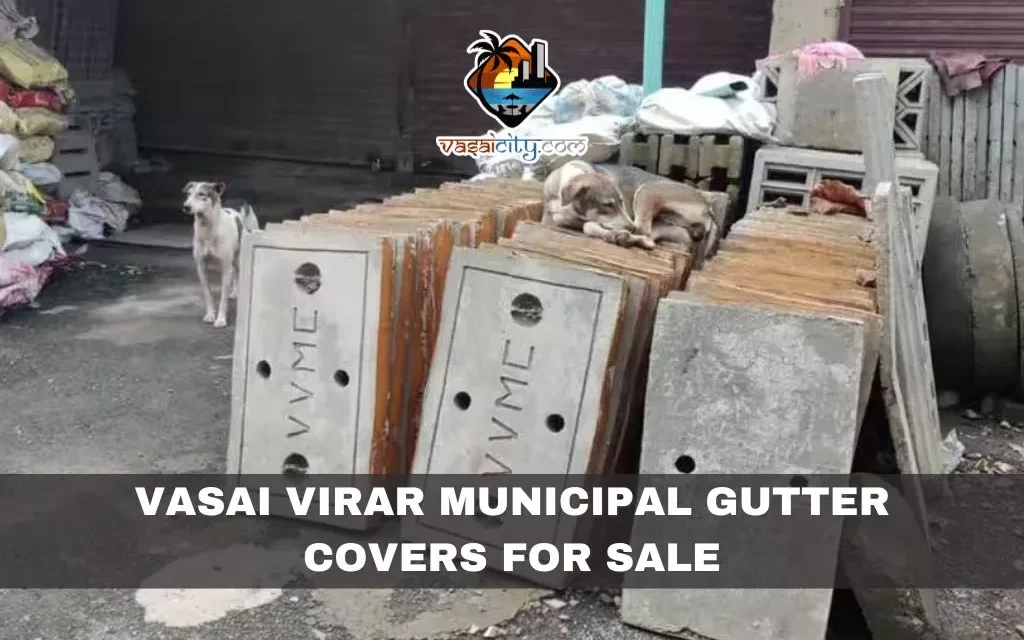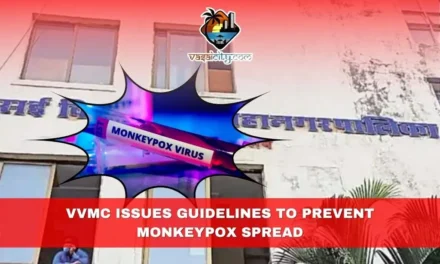In a surprising turn of events, gutter covers bearing the name of Vasai Virar Municipal Corporation have surfaced for sale across the city. This unexpected discovery has sparked questions about how these covers ended up for sale in local shops, leaving residents perplexed. The municipality, however, insists that there is no wrongdoing in this matter.
The gutter covers in question are typically installed by the Vasai Virar Municipal Corporation to safeguard street drains. Crafted from sturdy paver blocks, these covers prominently feature the initials of the municipality’s name. Yet, a peculiar situation unfolds in construction material stores throughout Vasai Virar City, where these very covers are available for purchase, priced at Rs 700 each.
Upon inquiry, a salesperson at Evershine revealed that customers seeking multiple covers must register in advance to secure their order. This leads to the pivotal question: how can private sellers peddle items labeled with the municipality’s name? This perplexing situation has prompted demands for an investigation into how these covers ended up in the hands of shopkeepers.
While some speculate that the covers on sale might be the result of theft, the municipality vehemently denies any wrongdoing. According to official statements, these covers are neither stolen nor misused. To understand this peculiar situation better, it’s essential to delve into the processes behind the installation and distribution of these gutter covers.
The Vasai Virar Municipal Corporation undertakes the responsibility of covering the city’s gutters, awarding contracts to contractors for this purpose. To curb the theft of these valuable covers, a unique measure has been put in place – engraving the municipality’s initials onto each cover. This seemingly simple action serves as a deterrent against theft.
Rajendra Lad, the city engineer of the municipality, sheds light on the situation, stating, “Contractors constantly require these covers for their work. To ensure that they can easily identify the covers as belonging to the municipality, they add their names to them.” This practice, he explains, is an unintended consequence of the municipality’s efforts to prevent theft.
In essence, what we are witnessing is a side effect of the municipality’s well-intentioned strategy to safeguard these covers. The engraved initials, which were meant to deter thieves, have now unintentionally given rise to a unique business opportunity for shopkeepers.
This unusual situation has garnered significant attention from both residents and authorities. Many are left wondering how such a practice could have evolved over time. To gain a deeper understanding, we must explore the implications and the reasoning behind this phenomenon.
At first glance, it may appear that these gutter covers are being sold without any oversight or control, but a closer look reveals a more complex reality. Shopkeepers who stock these covers aren’t doing so without a purpose. They are acting as intermediaries, facilitating the distribution of covers to contractors and individuals who require them.
It’s important to note that the covers available in stores are not stolen goods; rather, they are legitimate products sourced from the municipality’s authorized contractors. These contractors, who are responsible for the installation of gutter covers across the city, have adopted this unconventional approach to meet the growing demand for these essential items.
Contractors need a constant supply of these covers to fulfill their obligations, and the requirement is often urgent. Adding their names to the covers, as per the municipality’s guidelines, enables them to distinguish these covers from any potential thefts and also facilitates the smooth flow of work. In a city as bustling as Vasai Virar, where construction projects are a common sight, this practice has become a practical solution.
As we delve further into the matter, it becomes evident that the sale of these covers in local stores has unintentionally evolved into a well-organized system that benefits both contractors and shopkeepers. When a contractor needs a specific number of gutter covers, they can easily procure them from these stores, thanks to the prior registration system. This ensures a more streamlined and efficient distribution process.
Furthermore, the municipality itself is aware of this practice and does not view it as a breach of any laws or regulations. Instead, they see it as a pragmatic solution to an ongoing issue. The municipality’s primary concern is to protect its assets, and as long as the covers are not being stolen or misused, they are content with this unconventional arrangement.
The shopkeepers, who have become an integral part of this distribution network, play a crucial role in maintaining this delicate balance. They act as intermediaries between the contractors and the municipality, ensuring that the covers are provided as needed, while also generating revenue for themselves.
It’s worth noting that this unique practice is a testament to the ingenuity and adaptability of the local community. In the face of a challenge – the theft of gutter covers – they have devised a solution that not only safeguards these assets but also contributes to the local economy.
However, the situation has raised valid questions about the need for such a complex system in the first place. Shouldn’t there be a more straightforward way for contractors to obtain the covers they need without having to rely on third-party intermediaries?
One argument in favor of the current system is that it provides a level of security and traceability that is essential in preventing theft and misuse. The engraved initials serve as a clear indicator of ownership, making it easier to identify any unauthorized use of the covers. This, in turn, discourages potential thieves and vandals.
Moreover, the involvement of shopkeepers ensures that there is a reliable supply of covers available at all times. In a fast-growing city like Vasai Virar, where infrastructure development is ongoing, delays in obtaining essential materials like gutter covers can have significant repercussions. The current system addresses this issue effectively.
Nonetheless, there is room for improvement. As the situation gains more attention and scrutiny, it may be worthwhile for the municipality to explore alternative solutions that maintain security while simplifying the process.
One potential solution could involve a more direct partnership between the municipality and the contractors. By working together to establish a secure and efficient distribution system, both parties could benefit. This could include the creation of a dedicated supply chain that ensures a steady flow of covers to contractors while maintaining the necessary security measures.
Additionally, the municipality might consider investing in technology that allows for real-time tracking of these covers. By implementing RFID or GPS tracking systems, they could monitor the movement of covers, reducing the need for engraving initials and simplifying the process of identifying stolen or misplaced items.
In conclusion, the sale of gutter covers bearing the name of Vasai Virar Municipal Corporation in local stores has proven to be a unique solution to a pressing issue. While it may seem unconventional at first glance, it serves the dual purpose of preventing theft and ensuring a constant supply of essential materials for construction projects.
This situation highlights the resilience and adaptability of the local community, as well as their ability to find practical solutions to challenges they face. While the current system has its advantages, there is room for improvement, and it’s an opportunity for the municipality to explore more streamlined and technologically advanced methods of safeguarding its assets.
As Vasai Virar continues to grow and develop, it’s crucial to address these issues proactively to ensure the city’s infrastructure remains robust and secure while also supporting the local economy. In the end, the sale of gutter covers in local stores is not just a quirk of Vasai Virar; it’s a testament to the resourcefulness of its people.









